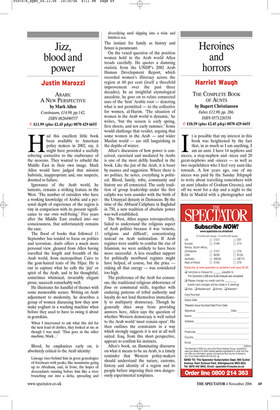Jizz, blood and power
Justin Marozzi
ARABS: A NEW PERSPECTIVE by Mark Allen Continuum, £14.99, pp.142, ISBN 0826490557 V £11.99 (plus £2.45 p&p) 0870 429 6655 Had this excellent little book been available to American policy makers in 2002, say, it might have provided a usefully sobering corrective to the exuberance of the neocons. They wanted to rebuild the Middle East in their own image. Mark Allen would have judged that mission hubristic, inappropriate and, one suspects, doomed to failure.
Ignorance of the Arab world, he laments, remains a striking feature in the West. ‘The number of outsiders who have a working knowledge of Arabic and a personal depth of experience of the region is tiny in comparison with its present significance to our own well-being.’ Five years after the Middle East crashed into our consciousness, that unfortunately remains the case.
The flood of books that followed 11 September has tended to focus on politics and terrorism. Arabs offers a much more personal view, gleaned from Allen having travelled the length and breadth of the Arab world, from metropolitan Cairo to the goat-haired tents of the Hijaz. He is out to capture what he calls the ‘jizz’ or spirit of the Arab, and in his thoughtful, sometimes whimsical, invariably elegant prose, succeeds remarkably well.
He illustrates his handful of themes with some memorable scenes. Writing on Arab adjustment to modernity, he describes a group of women discussing how they now make yoghurt in a washing machine when before they used to have to swing it about in goatskins.
When I intervened to ask what this did for the next load of clothes, they looked at me as though I was mad. ‘That goes in the other machine, Mark...’
Blood, he emphasises early on, is absolutely critical to the Arab identity:
Lineage rises behind him in great genealogies of forebears with peaks, like mountains going up to Abraham, and, in front, the hopes of descendants running before him like a river branching out into a delta, spreading and diversifying until slipping into a wide and limitless sea.
The instinct for family as history and future is paramount.
On the vexed question of the position women hold in the Arab world Allen treads carefully. He quotes a damning statistic from the UNDP’s 2002 Arab Human Development Report, which recorded women’s illiteracy across the region at 60 per cent (itself a threefold improvement over the past three decades). In an insightful etymological anecdote, he goes on to relate connected uses of the ‘hrm’ Arabic root — denoting what is not permitted — to the collective for women, al-Harim. ‘The situation of women in the Arab world is dynamic,’ he writes, ‘but the season is early spring, first shoots, and not early summer.’ Some would challenge that verdict, arguing that some women in the Arab — and wider Muslim world — are still languishing in the depths of winter.
Allen’s discussion of how power is conceived, exercised and mediated by Arabs is one of the most deftly handled in the book. Like the jizz of the Arab, it is beset by nuance and suggestion. Where there is no politics, he notes, everything is political. Blood, family, tribe, community and history are all connected. The early tradition of group leadership under the first caliphs was torn asunder with the birth of the Umayyad dynasty in Damascus. By the time of the Abbasid Caliphate in Baghdad in 750, a new tradition of absolute power was well established.
The West, Allen argues retrospectively, failed to understand the religious aspect of Arab politics because it was ‘remote, religious and difficult’, concentrating instead on Arab nationalism. If Arab regimes were unable to combat the rise of Islamism, we were unlikely to have been more successful. A less steadfast support for politically moribund regimes might have helped, of course, but the price risking all that energy — was considered too high.
The preference of the Arab for consensus, the traditional religious abhorrence of fitna or communal strife, together with enduring patterns of tribal authority and loyalty do not lend themselves immediately to multiparty democracy. Though he generally shies away from providing answers here, Allen says the question of whether Western democracy is well suited to the Arab world ‘must remain open’. He then outlines the constraints in a way which strongly suggests it is not at all well suited. Iraq, from this short perspective, appears to confirm his instincts.
Allen’s book, an illuminating discourse on what it means to be an Arab, is a timely reminder that Western policy-makers should understand the nature, customs, history and identity of a region and its people before imposing their own dangerously experimental templates.


















































































































 Previous page
Previous page